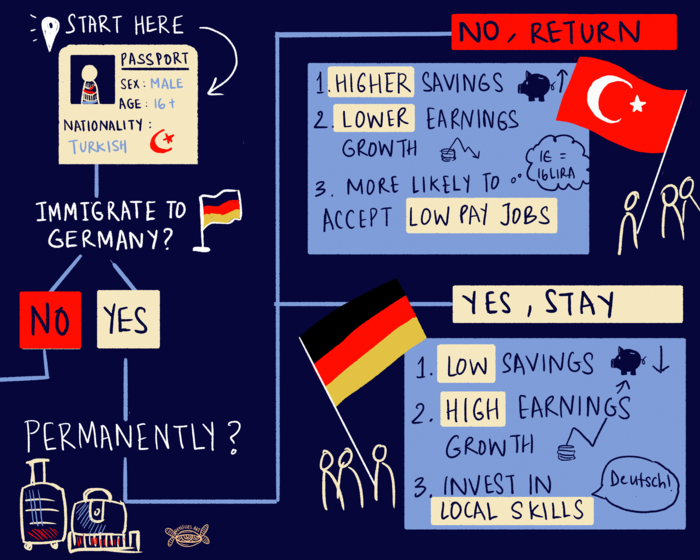New research finds that policies granting permanent residency to immigrants conditional on acquiring host country skills – like language – are most likely to generate higher fiscal contributions to the host country through income taxes. In fact, immigrants with a preference for remaining in the host country, develop social contacts and other specific skills that allow them to find better paid jobs and stay for a longer time.

Credit: Sahana Subramanyam
New research finds that policies granting permanent residency to immigrants conditional on acquiring host country skills – like language – are most likely to generate higher fiscal contributions to the host country through income taxes. In fact, immigrants with a preference for remaining in the host country, develop social contacts and other specific skills that allow them to find better paid jobs and stay for a longer time.
As immigration worldwide increases, host countries are faced with crucial policy decisions aimed at maximizing immigrants’ economic contributions. Designing the right policies requires understanding exactly how immigrants make their decision to migrate and return to their country of origin. Bocconi University, Milan, professors Jérôme Adda and Joseph-Simon Goerlach, with co-author Christian Dustmann (University College London), in a forthcoming article in the Review of Economic Studies, develop and estimate a mathematical model that provides key insights into the decision-making process of immigrants. They find that immigrants’ expectations for the length of their stay and their location preferences can explain their decisions to invest in career improving skills, their acceptance of lower-paying jobs compared to natives, and how they respond to immigration policies on the duration and possibility of permanent residence.
While previous research focused only on productivity differences between immigrants to explain their career profiles, the authors argue that location preferences could be crucial in determining how much immigrants invest in acquiring skills that consequently impact their career profiles. For instance, an immigrant who prefers the host country and intends to stay permanently may invest more in learning the local language, familiarizing themselves with the local labor market, and developing social contacts and other host country-specific skills. Alternatively, a migrant with a location preference for their original country may not invest in these skills as they are likely undervalued back there. The authors model this preference and estimate the impact of location preferences and planned migration duration using data from surveys of Turkish immigrants in Germany over three decades, starting from 1961.
Indeed they find that immigrants who remain are higher-skilled due to their conscious investment in host-country skills. Their model is also able to explain why immigrants may be more willing to accept low-paid jobs compared to natives. They argue that immigrants from countries that have a lower price level and who want to return home would face higher effective wages since their wage allows them to consume more at home over their lifetime. Knowing this may encourage temporary migrants to accept lower-paid jobs.
The authors also use their model to compare three different types of immigration policies prevalent today that grant permanent residency after 5 years either conditional on:
1. an earning threshold (like the UK);
2. acquiring host-specific skills such as language (like in some countries of the EU);
3. granted randomly with 30% probability.
The authors find that scheme 1 selects for high productivity migrants and scheme 2 for those with a high preference for the host country.
Assuming a population of 25-year-olds migrating to Germany in 1970 as an example to estimate on, the earning threshold rule would generate an annual per capita increase in tax payments by €782 compared to if the policy wasn’t there. The host-specific skills rule would generate an average annual tax gain of €789 and fewer tax losses due to fewer individuals leaving the host country. The random lottery instead leads to a decrease in average annual taxes by €633 since the expected returns to investing in host country skills are reduced due to the scheme’s reliance on random chance. Furthermore, schemes 1 and 3, due to the barriers they pose to seeking permanent residency, reduce total immigration by about 26% whereas the host-specific skills rule does so by around 3%.
Thus, the authors show how these schemes could have differential impacts when one accounts for not only immigrants’ productivities but also their location preference / expected duration of stay. As the recent Ukrainian refugee crisis shows, such considerations are crucial for both the host countries’ goals as well as the lives and decisions of the arriving immigrants and their integration and acceptance in host societies.
Jérôme Adda, Christian Dustmann, Joseph-Simon Goerlach, “The Dynamics of Return Migration, Human Capital Accumulation, and Wage Assimilation.” The Review of Economic Studies, Advance Article, DOI: https://doi.org/10.1093/restud/rdac003.
Journal
The Review of Economic Studies
DOI
10.1093/restud/rdac003.
Article Title
The Dynamics of Return Migration, Human Capital Accumulation, and Wage Assimilation
Article Publication Date
12-Feb-2022




